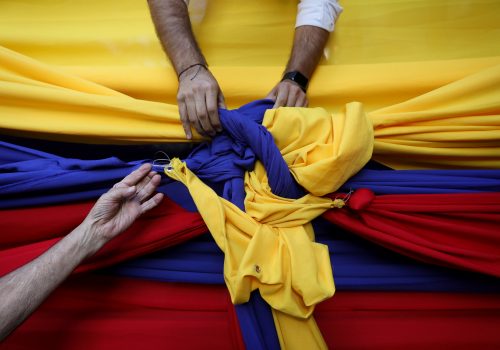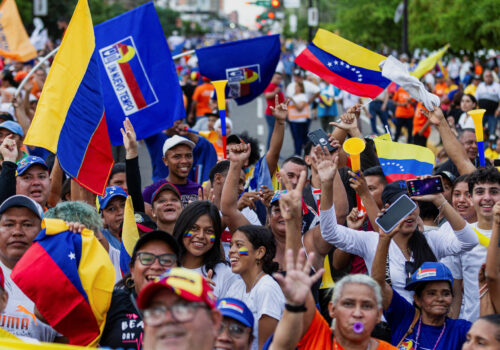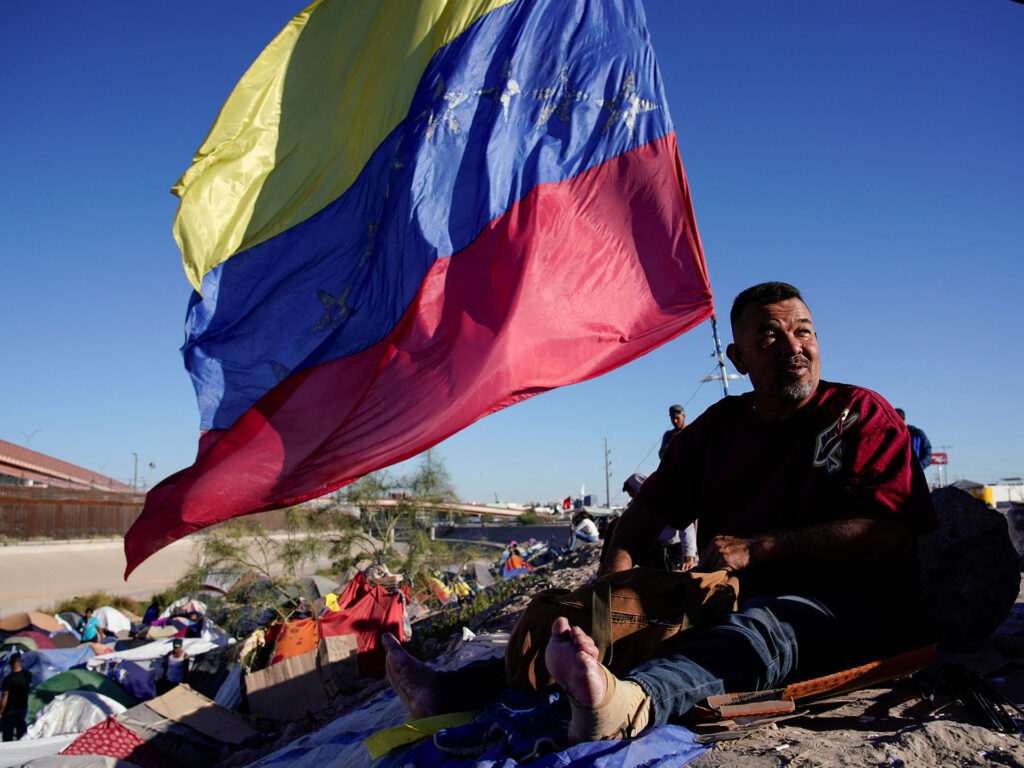Recalibrating the use of individual sanctions in Venezuela
In response to Venezuela’s Nicolás Maduro’s decision to claim a new illegitimate mandate on January 10 based on a stolen election, the United States and its allies face a major test of their strategy moving forward. Effectively pressuring the Venezuelan government will require innovative thinking on the use of individual sanctions from US authorities, as well as careful coordination between the United States and Latin American and European governments.
As Venezuela continues to grapple with a deep political and economic crisis, the international community is at a critical juncture in shaping its response. The stolen presidential election of July 28 marked a watershed moment, signaling the country’s further descent into authoritarianism under Nicolás Maduro’s regime. In this context, policymakers in the United States and other countries are likely to continue to impose sanctions against political, military, and economic elites as a means of seeking to exert pressure without worsening the humanitarian situation.
With over eight million Venezuelans displaced by the crisis, US and other international policymakers are cautious about the unintended consequences of tightening existing oil and financial sanctions. Although the outgoing Biden administration at one point said it was evaluating whether to rescind privately issued specific licenses that authorize energy companies to maintain a foothold in the country, it has not done so, partly out of an interest in preventing the worsening of economic conditions. Instead, the Biden administration prioritized sanctions against individuals responsible for Venezuela’s deteriorating human rights situation. On September 12, the Biden administration sanctioned sixteen government-linked individuals, including leaders of the National Electoral Council who oversaw the stolen election, and members of the Supreme Tribunal of Justice who validated the fraudulent results. Biden’s Secretary of State Antony Blinken said that the goal of the individual sanctions is to “promote accountability” for those undermining democracy in Venezuela. Three months later, Canada’s foreign ministry announced it would add five of these same individuals to their sanctions list for fraudulently declaring Maduro the winner of the July election. The US added an additional 21 individuals to the sanctions list in November 2024. Following Maduro’s illegitimate inauguration in January 2025, the US, Canada, and the EU all announced additional sanctions on regime officials and affiliates.
This interest in targeted sanctions is likely to continue under the second Trump administration, given that Trump’s first term saw heated internal debate over the potential impact of broader economic sanctions on Venezuela’s migration crisis. Indeed, the use of individual sanctions accelerated under President-elect Trump’s first presidential term even as he oversaw the imposition of broader sectoral sanctions targeting Venezuela’s links to the international oil and financial markets.
With Trump returning to the Oval Office, here’s what policymakers should know about the use of individual sanctions—and what can make Venezuela sanctions policy more effective.
The sticks: A history of the Venezuela sanctions regime
From 2009 to 2015, Venezuela-related sanctions were few and primarily targeted kingpin leaders involved in drug trafficking and financial support for Hezbollah. In March 2015, Executive Order 13692 created the country-specific sanctions regime on Venezuela. Seven military officials were initially sanctioned for their involvement in stifling protests. This program allowed the United States government to sanction individuals involved in human rights abuses, corruption, or the undermining of democratic processes. In November 2018, Executive Order 13850 created a new Venezuela-related sanctions program under which the United States could freeze assets and prevent actors from conducting corrupt transactions with the Venezuelan government to move money. In August 2019, Executive Order 13884 blocked Venezuelan government assets and enabled sanctions on actors assisting the Venezuelan government, and an initial seven military officials were sanctioned for their involvement in actions undermining democratic processes.
This graph does not include sanctions issued by the United States on January 10, the date of Maduro’s illegitimate re-inauguration.
The Obama administration sanctioned seventeen individuals, including the first seven military officials sanctioned under the Venezuela-specific sanctions regime. After Trump took office in January of 2017, the number of individual sanctions increased dramatically, with forty-one issued in 2017 alone. The administration issued twenty individual sanctions in 2018, forty-nine in 2019, and twenty-five in 2020. (These numbers do not include individuals who were sanctioned and later delisted). Under the Trump administration, some of the sanctions targeted Venezuelan access to the US dollar and to international financing, and therefore Venezuela’s ability to reconcile its sovereign debt. The Trump administration’s “maximum pressure” strategy took off in 2019, which saw the imposition of over 180 Venezuela-related sanctions, including the forty-nine targeting individuals. That year also saw the first implementation of sectoral sanctions on industries including oil, gold, finance, defense, and security.
This shifted under US President Joe Biden. Until September 2024, Biden had not added a single Venezuelan national to the Specially Designated Nationals (SDN) list since taking office. However, after the July 28 stolen presidential election, the government-backed National Electoral Council declared incumbent Nicolás Maduro the winner, despite opposition candidate Edmundo González emerging as the clear victor following the opposition’s independent collection and publication of over 80 percent of the official actas, electoral vote tallies produced by each voting center. Roughly a month and a half after the election, the United States announced new sanctions on sixteen individuals, for obstructing the elections and intensifying post-election repression, ultimately forcing Gonzalez to flee the country. Two more rounds of sanctions were announced in November 2024 and January 2025.
The carrots: When and why individual sanctions have been lifted
The Biden administration largely opted for a different approach than the first Trump administration, seeming to prefer carrots over sticks. On multiple occasions, Biden took Venezuelan nationals off the list.
In December 2021, the administration announced it would no longer designate the former Colombian guerrilla movement, Fuerzas Armadas Revolucionarias de Colombia (FARC), as a terrorist group. As part of a package of ninety-two FARC-linked delistings, the Treasury Department lifted sanctions on five Venezuelans including Ramón Rodríguez Chacín, a military officer and former Venezuelan minister of interior who worked as a go-between between the FARC rebels and the Venezuelan government.
In June 2022, the Treasury Department announced that it had lifted the sanctions on Carlos Erik Malpica Flores, a former national treasurer and vice president of Venezuela’s state-owned oil company PDVSA. Malpica Flores is also the nephew of current Venezuelan first lady Cilia Flores, and his delisting was reportedly part of an effort to induce the Venezuelan government to restart negotiations with the opposition—and indeed, days later opposition and government representatives met in Oslo. In November 2022, two other nephews of Flores, known as the “narcosobrinos” due to their involvement in transnational drug trafficking operations, were released as part of a prisoner swap that included the release of ex-officials of Citgo, the US-based subsidiary of PDVSA.
In July 2023, the Treasury removed Carlos Rotondaro, former board president of the Venezuelan Institute of Social Security (IVSS), from the SDN list. Sanctioned for “economic mismanagement and acts of corruption,” Rotondaro was reportedly delisted for providing information to the United States on financial movements made by the family of Haiman El Troudi, former Minister of Planning and Development and Minister of Public Works.
These delistings fit with the Biden administration’s broader reticence toward announcing new sanctions on Venezuela. Rather than rolling out new sectoral sanctions, the Biden White House sought to incentivize a democratic opening by issuing licenses to US and Western oil companies to operate in the country despite broader oil and financial sanctions, in exchange for a series of agreements between the government and the democratic opposition that led to the July 28 election.
Biden was not alone in attempting to use sanctions relief to incentivize change in Venezuela. Even as the first Trump administration ramped up the use of individual sanctions, it also offered sanctions relief to individuals who “take concrete and meaningful actions to restore democratic order, refuse to take part in human rights abuses and speak out against abuses committed by the government, and combat corruption in Venezuela.” As part of this strategy, the Trump administration lifted sanctions in two cases. In March 2019, the Treasury delisted the wives of Raúl Gorrín and Gustavo Perdomo, two regime-linked businessmen who reportedly tried to work as middlemen between Washington and Caracas. According to press accounts, Gorrín worked to support a failed attempt to overthrow Maduro in April of that year, and Treasury’s removal of his wife and the wife of his business partner from the sanctions list was a decision made in exchange for his support for the coup.
In May 2019, after the uprising failed, the United States delisted Manuel Cristopher Figuera, former Director General of Venezuela’s National Intelligence Service (SEBIN). Figuera had taken part in the coup attempt and fled the country when it failed. In its press release, the Treasury Department stated that the move “demonstrates that U.S. sanctions need not be permanent and are intended to bring about a positive change of behavior.”
Who’s on the list?
The United States has rescinded the visas of almost two thousand Venezuelans and currently sanctions 202 Venezuela-linked individuals on the SDN list (as of January 13, 2025). Of these 202, eighty-one have been sanctioned primarily for their current or former roles with Venezuelan security and intelligence outfits. Nine have worked in the military counterintelligence branch known by its Spanish-language acronym DGCIM, eleven have worked in the intelligence branch (SEBIN), thirty have worked in the national armed forces (FANB), twenty-six have worked for the national guard (GNB), and seven have worked for the national police (PNB). Some of these individuals have worked for multiple branches of the security or counterintelligence service.
The United States also has a history of sanctioning key Venezuelan political officials. Maduro has been sanctioned since 2017, and his wife and son have been sanctioned since 2018 and 2017, respectively. Attorney General Tarek William Saab was sanctioned in 2017. Vice President Delcy Rodríguez and her brother, Communications Minister Jorge Rodríguez, Former National Assembly President Diosdado Cabello and his wife and brother, and Defense Minister Vladimir Padrino Lopez were all sanctioned in 2018.
Beyond key officials of the Venezuelan government and their affiliates, the United States has also sanctioned several economic and financial elites linked to operations with the government or the state-owned oil and natural gas company. Veronica Esparza Garcia, Joaquin Leal Jimenez, and Olga Maria Zepeda Esparza were sanctioned in 2020 for “operating a sanctions-evasion scheme benefitting the illegitimate Maduro regime and PDVSA.” In early 2021, Alessandro Bazzoni, an Italian citizen, Francisco Javier D’Agostino, a dual Spanish-Venezuelan citizen, and Philipp Paul Vartan Apikian, a Swiss citizen, were sanctioned for their ties to “a network attempting to evade United States sanctions on Venezuela’s oil sector.” Apikian and his company, Swissoil, were removed from the sanctions list in June 2023. Bazzoni and D’Agostino were removed in January 2025.
Additionally, as of September 2024, eleven individuals connected to Venezuela have been sanctioned under the Foreign Narcotics Kingpin Designation Act and classified as “specially designated narcotics traffickers.” The sanctions connected with this particular designation are separate from the Venezuela-specific sanctions programs created by executive order but have been perceived by observers as connected to the US-led pressure campaign.
Coordinating sanctions with allies
This graph does not include sanctions issued by all three countries on January 10, the date of Maduro’s illegitimate re-inauguration.
The United States, with its current list of 202 designees, is not the only government that has sanctioned individuals related to Venezuela. Canada currently sanctions 115, and the European Union (EU) sanctions sixty-nine. Of the 202 US-sanctioned individuals, Canada sanctions eighty-three of the same individuals, while the EU sanctions fifty-eight. Forty-eight individuals are currently sanctioned by all three parties. Most of these were sanctioned by the United States months or years before they were sanctioned by Canada and the EU. These include high-level officials such as Delcy Rodríguez, Tarek William Saab, and Diosdado Cabello. However, it is notable that the EU has not placed individual sanctions on Maduro himself. Neither Canada nor the EU has placed sanctions on any individuals sanctioned by the United States that we have classified as economic elites.
Of the thirty-two people that Canada sanctions that the United States does not, a number are judicial officials such as magistrates and individuals associated with repressive acts. All except for one were sanctioned between 2017 and 2019. The eleven individuals sanctioned by the EU that are not sanctioned by the United States include people known to have committed human rights violations and officials contributing to the erosion of democracy and democratic institutions. Most of these were sanctioned between 2020 and 2021.
How effective are individual sanctions?
Individual sanctions can allow decisionmakers in Washington to signal a policy stance and provide a degree of accountability, which may be useful to victims of Venezuela’s authoritarianism. Listed individuals are unable to travel to the United States and they cannot operate directly in broader financial systems. There is an argument to be made that this makes the target’s life uncomfortable or at least more difficult, whether the sanctions involve freezing assets, limiting their mobility, or restricting business operations. Individual sanctions may also serve as a measure of justice for human rights victims. However, in Venezuela so far there is little evidence that being added to the individual sanctions list encourages defection. Only one case of a sanctioned official defecting exists (Manuel Christopher Figuera). Other key individuals who have defected, such as former Oil Minister Rafael Ramírez and former Prosecutor General Luisa Ortega Díaz, were never sanctioned by the United States (although Ramírez was sanctioned by Canada).
One way to tighten the strategy for individual sanctions involves targeting more overseas assets of Venezuelans who have contributed to political and economic destabilization, and those of their family members and associates. While some of the assets of more prominent Venezuelans have been seized, a number of Venezuelan officials still own properties in Miami and other US cities, Latin America, and Europe. According to a 2022 joint investigation by Armando.Info and El Nuevo Herald, at least 718 companies in Florida are owned by current or former Venezuelan officials, including over two hundred that are owned by members of the military. Most of these owners have not been sanctioned. While an SDN designation implies that all US properties and financial assets of the individual will be frozen, some sanctioned officials continue to have access to large financial networks through assets held by family members or affiliates who are not sanctioned. Ramping up the targeting of the asset networks of current or former affiliates of the dictatorship could potentially create more room for those affiliates to consider the value of remaining loyal to Maduro, while avoiding harming the Venezuelan people.
The key question lies in how international actors can sanction individuals in a way that pulls the regime apart instead of consolidating it. Maduro has honored some of those sanctioned with replicas of independence leader Simón Bolívar’s sword. After the most recent wave of sanctions, government officials have painted being sanctioned as a badge of honor, a sign of loyalty to the revolution. According to Defense Minister Vladimir Padrino López, being sanctioned is a recognition of officials’ “morale, physical and professional integrity, and their leadership.”
One way to mitigate this is to follow sanctions announcements with targeted, discrete, and strategic communication with sanctioned individuals on the steps needed to get off the list, as occurred in the case of Manuel Christopher Figuera. Similar communication could occur with individuals the government is considering sanctioning, as may have been the case with Ortega Díaz. Coordinating more closely with multiple countries to impose parallel individual sanctions on individuals can help the international community to align on sanctions priorities. This may include advising interested international allies on the creation of their own legal sanctions frameworks.
But sanctions should not be the only manner of engagement with regime affiliates. The goal should always be to identify and engage those most likely to support democratic reform from the inside. This means empowering moderate elements within Chavismo and isolating hardliners to maintain the potential for a peaceful, democratic solution.
Methodology
Designations were drawn from the following sanctions programs: VENEZUELA, VENEZUELA-EO13884, VENEZUELA-EO13850, SGDT, and SDNTK. For the SGDT and SDNTK programs, only Venezuelans or individuals sanctioned for Venezuela-related activities were counted.
At least four individuals on the SDN list are reportedly deceased but have yet to be removed from the list: Henry Castellanos Garzón, Hernán Darío Velásquez Saldarriaga, José Leonardo Noroño Torres, and Miguel Santanilla Botache. Castellanos Garzón and Darío Velásquez were ex-FARC commanders killed in 2021. Noroño Torres reportedly died in a transit accident in 2020, and ex-FARC dissident Santanilla Botache was reportedly killed in 2022. The Treasury often takes time to formally delist deceased individuals due to various factors, such as difficulty in obtaining a formal death certificate or verifying an individual is deceased, and ensuring the individual’s assets are not used by a third party. As these individuals are still on the SDN list, they were included in the analysis.
Geoff Ramsey is a senior fellow at the Atlantic Council’s Adrienne Arsht Latin America Center.
Lucie Kneip is a program assistant at the Adrienne Arsht Latin America Center.
The authors would like to thank Brennan Rhodes for his research support in contributing to this piece.
Related content

The Adrienne Arsht Latin America Center broadens understanding of regional transformations and delivers constructive, results-oriented solutions to inform how the public and private sectors can advance hemispheric prosperity.
Image: Venezuela’s President Nicolas Maduro speaks in front of the Venezuelan Supreme Court of Justice magistrates during the opening of the new court term, in Caracas, Venezuela January 31, 2024. REUTERS/Leonardo Fernandez Viloria


